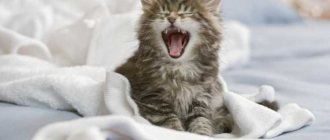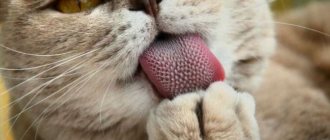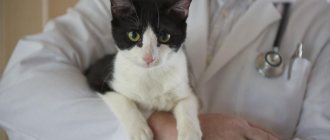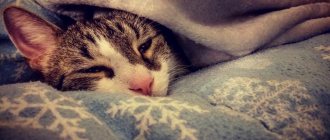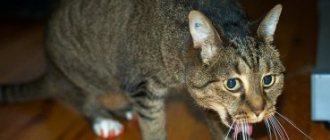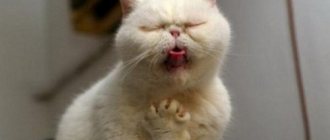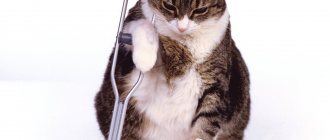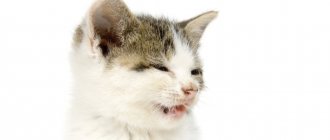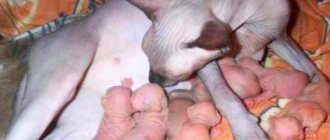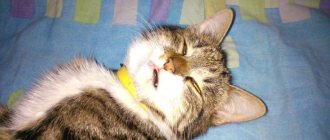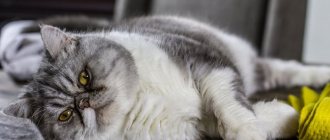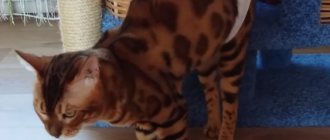When we take a tiny cute creature into our home, we don’t think about whether it is ready for independent life, how it will cope with separation from its mother and moving, meeting new people and conditions. Sometimes this becomes the reason for refusing food.
Pet owners need to keep in mind that signs of illness may also be accompanied by loss of appetite, so they need to be able to distinguish symptoms of illness from manifestations of other conditions. It is very important to understand why a small kitten does not eat, because with its symbolic weight it will quickly weaken and may die.
It is equally important to know what to do and what to do if the kitten does not eat anything. Sometimes it becomes a matter of life and death.
Signs of poor appetite
If an animal sometimes refuses to eat, then there is nothing wrong with that. You may not always notice weight loss right away. Cats that live indoors need less food. Therefore, they may sometimes not feel hungry and drink only water.
Loss of appetite may be a sign of serious problems
Veterinarians identify several thinness indices. When exhausted, the animal's ribs clearly appear; if you look at it from above, its figure will resemble an hourglass. The stomach is strongly retracted.
If the cat is underweight, the ribs and spine will be clearly palpable, and there will be no fat layer. With normal weight, the animal looks like an even rectangle from above. The ribs can be felt during normal examination, but a small amount of fat will be felt.
Important! Being overweight is just as dangerous as being underweight.
The owner should only start to worry if the cat is emaciated or underweight. In this case, it is better to consult a veterinarian to determine the cause of the weight loss.
Sometimes the condition is accompanied by additional symptoms - vomiting, drowsiness, lethargy. All this may indicate the development of a serious illness. A particularly dangerous sign is refusal of water.
Poisoning as a reason why a cat eats poorly
Poisoning always takes place in an acute form, with a sharp refusal of the cat to eat and frequent bouts of vomiting, as well as other signs that are easy to distinguish upon visual inspection by the owner himself:
- Yellowness of visible skin appears
- Partial or complete absence of urination
- Convulsive contraction of the animal
- Arrhythmia and blue discoloration of visible skin
- Bloody discharge during vomiting and bowel movements
- Dyspnea
Confirmation of the diagnosis requires emergency intervention by a veterinarian and hospitalization of the pet in a veterinary clinic.
Natural causes
Why does a cat eat its kittens: natural and pathological reasons
Sometimes refusal to eat is due to changes in the cat's body. In this case, there is nothing to worry about, and the problem will solve itself. For example, on a hot day, all pets eat little, but drink a lot of clean water.
Season
In summer there is often high air temperature. At such times, even people prefer to eat less. Kittens and older cats have a particularly hard time withstanding the heat. Therefore, you should not insist on eating.
The animal should always have access to clean water
Once the air temperature drops, the cat will begin to eat again. Sometimes a pet prefers to wait for the coolness of the night and only then start dinner.
Hormonal changes
If your cat is not eating well but is active and active, this may be a sign of puberty. An animal that is one year old may become a little aggressive and agitated. He begins to play games of a sexual nature, cats begin to mark their territory, and cats begin to meow in their guts.
In pets during this period, the reproductive instincts occupy a dominant place. Therefore, food ceases to interest them due to loss of appetite.
Important! In rare cases, the male may completely refuse food, try to escape, and he begins to go crazy. In this condition, the intervention of a veterinarian is necessary, who will prescribe sedative tablets.
Belching
Britons, Persians, Siberians and other breeds with thick coats can get a small side effect from licking - hairballs accumulate in the stomach.
In severe cases, this leads to complete intestinal obstruction and the need for urgent surgery. Therefore, if a cat has lost weight, lost its appetite and becomes lethargic, then the animal should be urgently shown to a doctor.
Stress
Cats are very sensitive to environmental changes. Therefore, they too may be prone to anxiety and restlessness. The reason may be a move, the appearance of a new animal or child, quarrels, or punishment.
Important! When stressed, a cat tries to hide in an inaccessible place.
In severe cases, it is recommended to sedate your pet. The medicine will help reduce anxiety levels.
Power change
In the modern world, you can find different cat food. Different brands have their own lines, which differ in composition. Sometimes a pet has to be switched to medicated dry food, which may have a specific taste.
Any new products should be introduced gradually. For example, if you plan to transfer an animal to another food, then first they are mixed with each other.
When using wet food, you need to pay attention to storage conditions. Bags and jars are placed in the refrigerator, otherwise they will quickly spoil. Therefore, if the cat eats little, then it is worth checking the quality of the food.
Age
Older animals are more prone to developing chronic problems. Therefore, at this age it is recommended to give special food that is designed for old animals.
An older pet may have problems with teeth and gums
The owner does not always understand why the cat does not eat well. When visually examining the mouth, you can see redness and swelling of the gums - this is a sign of gingivitis. It is enough to remove tartar and use special ointments to relieve inflammation.
Important! It is better to give soft food to older animals, as it is easier to eat.
Foreign body
If the pet is active and asks for food, but ultimately does not touch it, then it is worth examining its oral cavity. A bone or hard piece may become stuck in the gum. Painful sensations will prevent the animal from eating.
Sometimes a fish bone gets stuck in the throat. In this case, the owner will not be able to get it out on his own and needs to contact a veterinarian. Therefore, if a cat wants to eat, but refuses to take pieces, you should carefully examine its mouth.
The main causes of poor appetite in cats
Cats by nature have a delicate internal organization. They are capricious and capricious, and unlike a dog, forcing it to do something against its will is very problematic. This also applies to food intake, for example, meaning dietary nutrition, which can be prescribed by a veterinarian as additional therapy for kidney failure, liver disease or disorders of the digestive system. Cats are picky creatures; they are capable of rejecting food offered by their owner that is not to their taste until they receive the coveted tasty morsel. But if there is a periodic refusal to eat and the owner notices that the cat eats very little, regardless of the food offered, you should be wary. This may be a sign of a systemic disease caused by a number of reasons that every cat owner should be aware of.
What to do
A pet will not lose weight immediately, and therefore the owner may not notice the changes for a long time. As a result, the problem becomes obvious when the cat has lost a lot of weight.
The cat licks and swallows saliva: the main reasons
It is advisable to immediately show the cat to a veterinarian. If this cannot be done, then the animal is provided with a quiet and calm place. He may meow restlessly, then he can be given a light sedative “Cat Bayun” or “Stop-Stress”.
Do not try to force feed an animal. You can try offering another food, for example, baby meat puree. The owner should not rely on the condition of the nose. Even if it is wet, this is not an indicator of health.
You should immediately take your cat to the vet if the following symptoms occur:
- heat;
- loss of consciousness;
- apathy;
- frequent vomiting.
The veterinarian will examine the pet, do tests and prescribe treatment.
Important! In case of intestinal obstruction, urgent surgery is needed, since without it the animal will die.
If your cat begins to eat little due to kidney failure
There are two types of kidney failure in cats - acute and chronic, which are characterized by refusal to eat. There is severe emaciation of the animal, frequent vomiting and urination, as well as a constant feeling of thirst. A common cause of this condition may be poisoning from flowers of the lily family. The condition of acute renal failure can be treated with timely contact with an experienced veterinarian. Resuscitation facilities and prompt implementation of treatment procedures will help restore your pet’s health in the shortest possible time.
Pathological causes
Why does a kitten's whiskers break: the main reasons and what to do
Don't delay visiting the veterinarian. A cat may not eat enough due to serious illnesses. In this case, lack of treatment will lead to the death of the animal.
Parasites
If the cat has lost a lot of weight, but eats well, then this is the first sign of infection with worms. The invasion is accompanied by nausea, perverted appetite, and bloody clots in the stool.
Parasites can cause loss of appetite in animals
Parasites are not always visible in feces, and therefore the owner may not be aware of the pet’s illness. Therefore, a person can see that a cat is losing weight, but eats well, but this may not be clear to him. In this case, you need to submit your stool for analysis, which will reveal the eggs of the worm.
Parasites can affect not only the intestines, but also all internal organs. In severe cases they are fatal. To get rid of worms, special tablets are used, which are given to the animal according to the scheme.
Oncology
Pets are also susceptible to malignant tumors. They appear especially often in cats that were sterilized late.
Important! Benign tumors also occur, but are rarely detected.
Any large neoplasm negatively affects the animal’s body and causes unpleasant symptoms - loss of appetite, lethargy, drowsiness and others.
Treatment and maintenance therapy in this case can only be prescribed by a veterinarian. Therefore, if a cat is not eating well and is losing weight, it is worth taking it to the clinic for examination. Only this will give a complete picture of the problem.
Diseases of internal organs
Poor nutrition and congenital problems can lead to various diseases. A diabetic cat is constantly thirsty and may refuse to eat.
If there are problems with the liver and inflammation in the genitourinary system, the animal has an appetite, but the cat will not want to eat. It will only cause discomfort.
Appetite may suddenly disappear during infectious diseases. With rabies, hydrophobia appears, i.e. the animal is thirsty, but does not start drinking. Gradually, excessive salivation, hypersalivation and other problems increase.
Important! Rabies cannot be treated and the animal must be euthanized. With distemper, a cat develops a high fever, frequent diarrhea and vomiting. In this case, the pet can only be helped if the disease is detected early.
Against the background of weak immunity, minor inflammatory processes may appear. For example, stomatitis is damage to the gums in the form of small ulcers. All this happens against the background of an exacerbation of the leukemia virus. With such a disease, the animal needs constant maintenance medications. Only they can extend the life of a cat. Viral enteritis is characterized by its rapid nature.
A sudden loss of appetite is accompanied by bloody diarrhea and vomiting, dehydration and death quickly occur. Therefore, you should not delay your visit to the veterinary clinic.
Only testing and examination will allow you to prescribe competent treatment that will save the animal’s life.
How to fix the situation
If the animal does not show signs of disease, you need to calculate the cause and try to eliminate it. The approach in each case will depend on the conditions. For example, if there are frequent hormonal changes and sexual heat, it is recommended to castrate your pet. This will correct his behavior and relieve discomfort when instincts become aggravated.
When stressed, the conditions of keeping the animal are reviewed. He is given a personal territory where he can rest. Small kittens that are early weaned from their mother can be supplemented with a milk replacer, then gradually introduced complementary foods.
Diagnostics
The main difficulty in identifying the cause of weight loss is that it can be a sign of various disorders. Therefore, an in-person consultation with a veterinarian and a detailed examination is necessary.
In order to make an accurate diagnosis, tests are taken
It is imperative to undergo tests, since only they allow you to present a complete picture of the disease. In order to understand why a cat is losing weight, a general and biochemical blood test is prescribed, urine and feces are studied. Already these data will give an idea of the work of internal organs.
It is advisable to take an x-ray of the abdomen and chest. Treatment is prescribed only after the exact cause of weight loss has been established. If the animal has a small amount of fur accumulated, then a special paste is sufficient.
If an inflammatory process is detected in the mouth, it is recommended to clean the tartar and use healing ointments. This hygiene procedure should be done once a year.
The most difficult thing is to correct hormonal disorders. During heat, the animal behaves inappropriately and this cannot be changed in any way. Light sedatives will not completely eliminate sexual desire. Therefore, it is better to castrate and sterilize non-breeding animals.
Important! The operation is completely safe for pets and improves their quality of life.
The heat does not always occur in the spring. In some animals it occurs at any time of the year. Sterilization helps protect your cat from developing mammary cancer. Castration of males is not so traumatic and allows you to wean the cat from marking its territory.
A cat may be thin due to worms. In this case, a course of special medications is sufficient. They should only be prescribed by a doctor, since the type of parasites and the degree of infestation matter.
Serious diseases are the most difficult to treat. In oncology, much depends on the size of the tumor and its location. In some cases, surgery can extend the life of a pet.
The earlier the problem is identified, the greater the chances of its successful treatment.
Bacterial infections are treated with a course of antibiotics, viral diseases with supportive medications. If a cat has discharge from the eyes, the owner should clean them regularly.
In addition to treatment, it is important to create special conditions for the pet’s recovery. To do this, they will organize a quiet and peaceful place for him to relax. The cat is allowed to sleep as much as he wants. During the treatment period, he is provided with nutritious, high-quality nutrition.
Popular brands of food have special dietary lines that allow you to provide the animal with all the necessary vitamins and minerals.
Important! If a cat's teeth fall out, it is provided with soft food during this period. Pates or baby meat puree are suitable.
What to do, how to stimulate an appetite and feed the baby?
If your baby has suspicious symptoms, it is best to take him to the vet immediately. The problem with parasites is easily resolved. The tailed patient is prescribed an antiparasitic drug. Disturbances in the functioning of internal organs that provoke a complete or partial loss of appetite are eliminated by conservative or surgical methods, depending on the type of disease and the degree of development of the pathological process.
Sometimes, to solve the problem, it is necessary to replace the bowl, give the baby a sedative approved by the veterinarian, or change the food. The following ways will help to arouse your pet's interest in food:
- Place a small amount of wet food in a bowl. To attract the kitten's attention, use aromatic, slightly warmed food.
- Dip your finger in milk, sour cream or meat gravy and bring it to the baby’s nose. If he turns away, wait 30-60 minutes and try again. If a pet that ignores the contents of the bowl licks its finger with appetite, this procedure should be repeated, gradually moving the finger closer to the feeder. Having tasted the treat from the owner's hands, the baby will try to eat from the bowl.
Some kitten owners prefer to feed their pets rich broths. This is not recommended, because the incompletely formed digestive system is not yet ready to digest fatty foods. It is especially difficult for animals that have been starving for several days. A body weakened by hunger requires light food.
What to do if the kitten does not eat or drink
When we take a tiny cute creature into our home, we don’t think about whether it is ready for independent life, how it will cope with separation from its mother and moving, meeting new people and conditions. Sometimes this becomes the reason for refusing food.
Pet owners need to keep in mind that signs of illness may also be accompanied by loss of appetite, so they need to be able to distinguish symptoms of illness from manifestations of other conditions. It is very important to understand why a small kitten does not eat, because with its symbolic weight it will quickly weaken and may die.
It is equally important to know what to do and what to do if the kitten does not eat anything. Sometimes it becomes a matter of life and death.
